The Forum was attended by 480 delegates, who are business and business association leaders, governmental officials, and representatives from international organizations, non-governmental organisations and research institutes. Outstanding speakers included Baroness Glenys Thornton - Shadow Equalities Minister in the House of Lords, the United Kingdom, H.E. Le Luong Minh - ASEAN Secretary General, H.E. Giles Lever - British Ambassador to Vietnam, Mr. Mari Amano - Secretary General of Asian Productivity Organisation, Mr. Nguyen Ba An - Secretary General of the National Council for Sustainable Development and Competitiveness Improvement, Mdm. Victoria Kwakwa - Country Director of the World Bank for Vietnam, Mr. Filippo Veglio – Director of the Social Impact Cluster, World Business Council for Sustainable Development (WBCSD), and Mr. Puvan Selvanathan - Head of Sustainable Agriculture Working Group at the United Nations Global Compact.
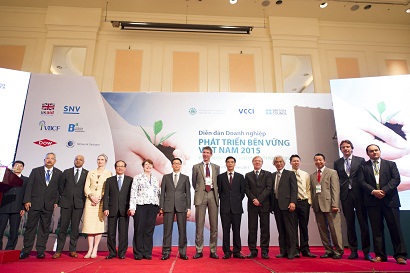
Specially, the presence and keynote speech by Deputy Prime Minister and Chairman of the National Council for Sustainable Development and Competitiveness Improvement, H.E. Vu Duc Dam, was a great honour to VCSF 2015. In his keynote speech to the Forum, Deputy Prime Minister Vu Duc Dam appreciated the results that the VCSF 2014 had brought to the business community and especially leveraged positive changes in promoting the implementation of recommendations on Sustainability Reporting, Inclusive Business Development, Social Enterprises and Energy Efficiency in Production and Business. The Deputy Prime Minister highly valued VBCSD for its important contributions to the Government by giving opinions, offering criticisms and supporting policymaking during its five years of operation.
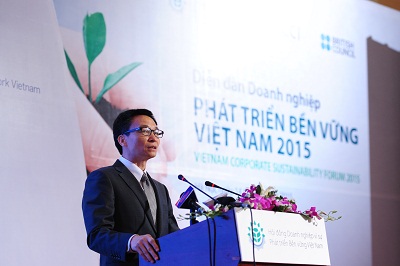
The Deputy Prime Minister said that the Government of Vietnam advocates the balanced growth policy, meaning that it will not accept rapid growth at any cost. To develop sustainably, businesses need to have a long-term vision and understand their responsibility to the community and society. For his part, the Deputy Prime Minister affirmed that the Government has, and will, done its utmost to improve the business environment and change resources allocation mechanisms where sustainable businesses will hold a priority ticket.
In his keynote speech to the Forum, Dr. Doan Duy Khuong, VCCI Vice Executive President cum VBCSD Co-Chairman, pointed out that low productivity and incompliance with regional and international standards and practices on sustainable development are the main obstacles to Vietnam’s business competitiveness in the context of deeper integration into the regional and global economies. He underlined VBCSD/VCCI’s efforts for supporting the business sector to improve productivity, competitiveness and sustainable development, typified by the coordination with the Government in drafting and executing the Resolution 19 on improvement of business environment and national competitiveness and the coordination with WBCSD and Business Councils for Sustainable Development in ASEAN member countries to carry out the SEA Action 2020 - an action programme of Southeast Asia businesses towards 2020, with a sustainable business vision to 2050.
.jpg)
Mr. Vorapong Vorasuntharosoth, Government Affairs Director - South East Asia/ANZ Region of Dow Chemical Company cum Co-Chairman of VBCSD, shared how the Corporate Sustainability Index (CSI) is developed by VBCSD. CSI is a gauge to measure the corporate value based on sustainability criteria in economic, environmental and social aspects and a tool to identify measurable objectives and administer changes for greater sustainability. CSI is expected to be completed and will be used as a tool to rate 100 most sustainable businesses from 2016 onwards.
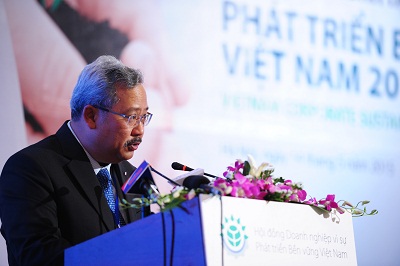
H.E. Giles Lever, British Ambassador to Vietnam, emphasised the important role of the private sector in promoting national sustainable development. He also introduced some typical major programmes that the British Government is carrying out in Vietnam to encourage innovative and sustainable business models such as social enterprises, inclusive business and green growth.
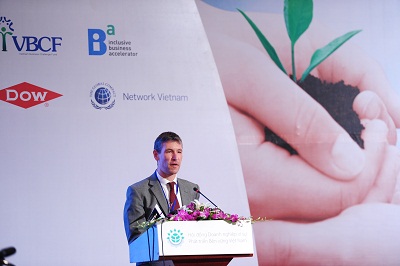
H.E. Le Luong Minh, ASEAN Secretary General, presented a keynote on “Roles of the business sector in building a sustainable ASEAN Economic Community.” He affirmed that ASEAN sustainable and comprehensive economic development objectives beyond 2015 can be achieved only when businesses in the region, by means of exercising social responsibility, contribute to the process of building and strengthening ASEAN Community, especially in human development, social security, social welfare and environmental protection. Doing this not only signifies their corporate responsibility but also gives them enormous business opportunities and competitive advantages in the market.
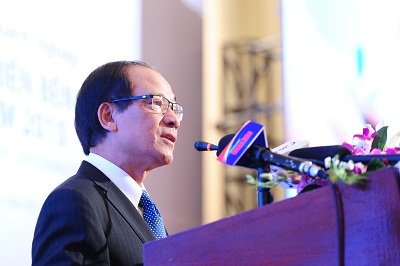
Mr. Nguyen Ba An, Secretary General of the National Council for Sustainable Development and Competitiveness Improvement, updated improvements in the business environment in Vietnam after the Government issued Resolution No. 19. Based on good results achieved in 2014-2015, Vietnam targets to bring its investor protection index to 52nd place from the 157th position, the setting up the business index to 60 from 109; tax payment index to 134 from 149, access to electricity index to 111 from 115. With these results, the ease of doing business index of Vietnam is expected to climb to the 56th position. In the coming period, Vietnam will focus on institution (basic factors) and invest in productivity improvement factors.
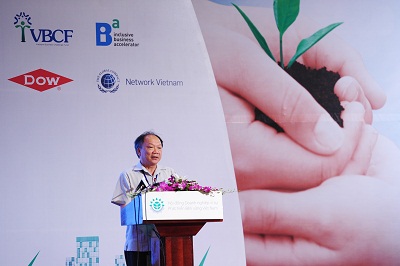
Baroness Thornton - Shadow Equalities Minister in the House of Lords, the United Kingdom, shared valuable experience in social enterprise development in the UK. She said social enterprises play a very important role in sustainable development. However, according to a recent survey in the UK, social enterprises are facing three big issues: Difficult access to capital, unfavourable business environment and unequal treatment in public procurement. From the experience in the UK, she recommended that Vietnam will need a transparent and clear legal framework for social enterprises and close cooperation between the Government and stakeholders to promote the development of this type of business.
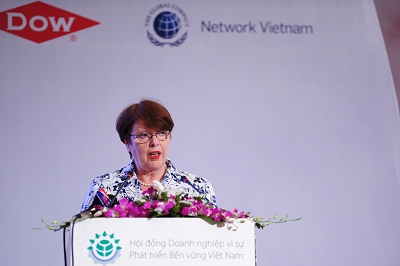
Mr. Mari Amano, Secretary General of Asian Productivity Organisation (APO), presented APO’s support activities for its developing member countries to increase productivity and avoid middle-income trap. He noted that scientific and technological application, innovation-led productivity growth and human capital development are essential for boosting productivity in developing economies.
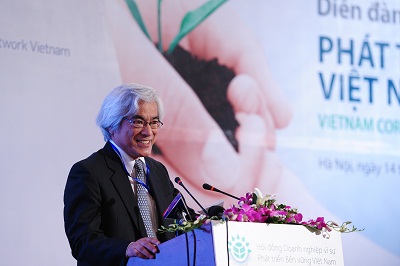
Mr. Javier Ayala, Executive Director of Vietnam Business Challenge Fund (VBCF), delivered a keynote presentation on “Corporate-NGO Partnerships for Inclusive Business Development.” He said non-governmental organisations (NGOs) such as VBCF/IBA in Vietnam, provide financial and technical supports for enterprises, especially small and medium-sized ones, and successfully convey business ideas. He also shared some successful inclusive business models in Vietnam funded by VBCF.
Dr. Puvan Selvanathan, Head of Sustainable Agriculture, United Nations Global Compact, delivered a keynote presentation themed “Leveraging the Food & Agriculture Business Principles (FABs) for ASEAN.” The criteria for FABs are simplicity and accessibility for all stakeholders in agricultural production value chain. By using FABs, farmers will change current agricultural production models towards sustainability, thus helping realise ASEAN food security goals.
The panel discussion, themed Global Competition for Sustainable Development: Challenges and Opportunities of Businesses”, was chaired by Mdm. Pham Chi Lan - a senior economic specialist, and attended by Mdm. Victoria Kwakwa - World Bank Country Director for Vietnam, Mr. Javier Ayala - Executive Manager of VBCF, Mr. Vorapong Vorasuntharosoth - Government Affairs Director - South East Asia of Dow Chemical Company, Mr. Tran The Cuong, CEO of Viettel ICT, Viettel Group, and Mdm. Do Lan Anh, General Manager of Loscam Vietnam.
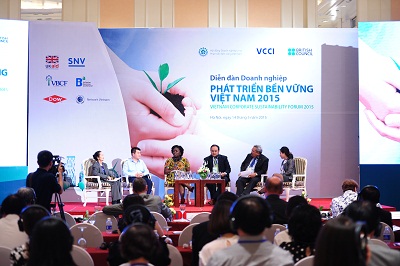
- As the United Nations has prepared to announce the Sustainable Development Goals (SDGs) in place of the Millennium Development Goals (MDGs) after 2015, the business sector will play a key role in realising SDGs in Vietnam. Specifically, businesses need to closely cooperate with the Government in the process to adapting SDGs to Vietnam’s context and conditions as well as integrating sustainability factors into their business strategies and models.
- Vietnam will shortly join the ASEAN Economic Community and sign many free trade bilateral and multilateral agreements, including Trans-Pacific Partnership Agreement, with many countries in the world. In the context of integration, applying international rules and practices on sustainable development will be one of main factors that help businesses maintain and improve business efficiency.
- Sustainable business models in Vietnam are potentially successful. This has been evidenced by information on inclusive business shared by representatives from SNV and Viettel Group.
Delivering the closing remarks to the Forum, Mr. Nguyen Quang Vinh, Deputy Secretary General of VCCI cum Secretary General of VBCSD, said the attendance of business executives, government officials and representatives from international organisations to the VCSF 2015 demonstrates the growing interest of the community in sustainable development of Vietnam in general and of Vietnamese enterprises in particular.
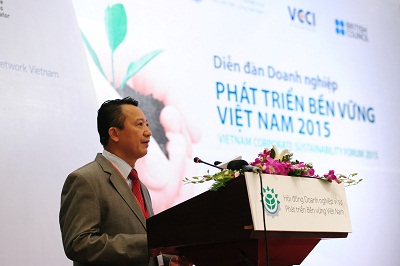
Delegates have discussed main Forum topics and tasks that the VBCSD will deploy in the future, including:
- Promoting roles of businesses in realising the Sustainable Development Goals by 2030, especially encouraging the active participation of businesses in the Government’s important strategies like Vietnam Sustainable Development Strategy in the 2011-2020 period, the National Green Growth Strategy in the 2011-2020 period and the National Strategy on Climate Change.
- Implementing the VBCSD Action Plan 2020, including the implementation of recommendations at the Forum.
- Coordinating with the Vietnamese business community and VBCSD’s partners to successfully carry out the Action Programme for the implementation of the Government’s Resolution 19.
- Collaborating with the Asian Productivity Organisation and the Vietnam National Productivity Institute to build and deploy Vietnam Business Productivity Improvement Project.
- Compiling contents for the Vietnam Corporate Sustainability Forum 2016.
Inclusive business development
- There is a need to create mechanisms for promoting and expanding inclusive business in Vietnam, and to open new funding instruments similar to the “Vietnam Inclusive Innovation Project” that funds businesses operating in various industries with different capital needs.
- The Government necessarily considers using tax instruments to support inclusive business model.
Sustainability Reporting
- Sustainability Reporting must be institutionalised in the Vietnamese legal system, e.g. including it to the Law on Enterprises as a mandatory responsibility.
- The Government necessarily considers participating in international initiatives on Sustainability Reporting, e.g. the Group of Friends of Paragraph 47 (GoF47) - an intergovernmental initiative aimed to promote the implementation of the Recommendations on Sustainability Reporting stated in the Outcome Document of the 2012 United Nations Conference on Sustainable Development (Rio+20) - to receive necessary technical assistances for accelerating the application of Sustainability Reporting in Vietnam.
- It is necessary to develop a “Sustainability Reporting Consultation Network” that enables Vietnamese businesses to seek for assistance easily in case of necessity and reduce Sustainability Reporting costs.
- “Corporate Sustainability Index” needs to be created as a tool to assess and rate sustainable businesses on the annual basis, thus inspiring the business community to adopt sustainable development in general and Sustainable Reporting in particular.
Social enterprise development
- VCCI/VBCSD necessarily coordinates with relevant agencies to widely disseminate the blueprint Decree on Social Enterprises to raise public awareness of this type of business.
- A mechanism for promoting the development of social enterprise community is needed. This mechanism includes financing channels, capacity building and market development. This also helps raise public awareness of products and services made by social enterprises, and promote domestic and international investment cooperation and goodwill for this business community.
- The Government needs to assign the Vietnam Bank for Social Policies to expand beneficiary scope to include social enterprises. Currently, a majority of social enterprises are very, very small but they are not qualified for bank loans because they are not business households.
- Regulatory policies and programmes are needed to facilitate cooperation between the ordinary business community and social enterprises, thus enabling the latter to improve business skills, administration and product marketing and encouraging ordinary businesses to take notice of social enterprises.
Transparency - one of the elements building foundation for a good company - is becoming an influential part in making decision about which enterprises are better to work and devote for. In the long run, transparency could help creating a healthier working environment, leading to a more productive workforce, and generating greater outcome. It directly touches human factor where HR management engages in deeply.
Deputy Prime Minister Vu Duc Dam urged businesses to pay greater attention to sustainable development amid deepening global integration and growing competition at the Viet Nam Corporate Sustainability Forum 2015 held yesterday in Ha Noi.
New facility to support Asia demand in key growth markets for versatile polyurethane chemistry
Starting from post-course feedbacks and assessments from trainees and basing on the actual needs of international purchasers, VBCSD and IEH joined hands to launch the Dialogue@Work Vietnam Project in 11 months, starting from January to November 2015.
The Corporate Sustainability Index (CSI) is developed as a gauge of corporate values based on sustainable development criteria in the fields of economy, environment and society, and a tool to record measured items and manage changes for the sake of better corporate sustainability.
On 10th of March, representatives of six Business Councils for Sustainable Development (BCSDs) from Indonesia, Malaysia, Philippines, Singapore, Thailand and Vietnam participated in the meeting of the Action 2020 in Southeast Asia (SEA Action2020) Project in Bangkok, Thailand. At this meeting, the deputies introduced their Councils’ sub-projects under the umbrella of SEA Action 2020 and updated the progress of those sub-projects.
Natural capital is a new way for business to think of the environment — a way that overcomes the current disconnect between economic growth and nature
Focused on finding “breakthroughs for inclusive and sustainable growth in ASEAN post 2015”, the ASEAN Next-Gen Corporate Social Responsibility Forum was held at the Laguna Resort in Bali, Indonesia from 3-7 February, with ASEAN Secretary General Le Luong Minh and Indonesian Coordinating Minister for Human Development and Culture Puan Maharani as guests of honour.
Following the award of USD 2.5 million to the first eight companies in October 2013, VBCF has decided to invest an additional funding of USD 6.5 million to 13 innovative and inclusive business ventures in three focus areas, including agriculture (42%), low carbon growth (33%), infrastructure and basic services (25%)
Low productivity is the main factor hampering competitiveness - the key to economic growth. Vietnam is at risk of being left behind in the economic development race if its productivity disadvantages are not addressed.